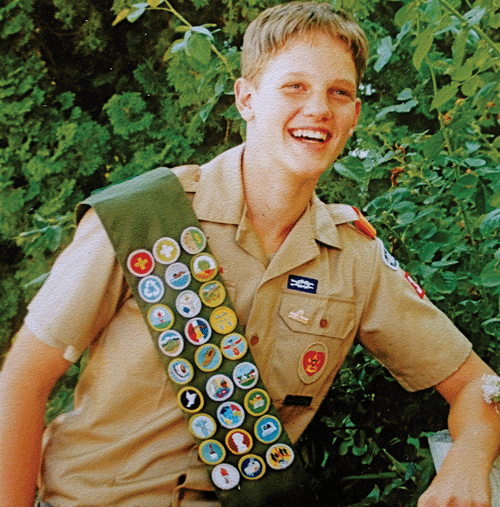As a young man I was a Boy Scout – khaki shirt, shoulder sash, merit badges, and all. Like all of the other boys in my troop, I used to stand at attention and recite the Scout oath and law. We would swear on our honor to do our duty to God and country, and to obey the scout law – to be trustworthy, loyal, helpful, friendly, courteous, kind, brave, and clean. We promised to help other people at all times, and to keep ourselves physically strong, mentally awake, and morally straight. “Be prepared” was our motto. Perhaps then it seemed to be a bit platitudinous, but today I realize those words worked on us as young men to found a basis for a life of service to others.
Today I realize being an ER doc is not so far from being a Boy Scout. Like the scout motto, we're always prepared; we often rely on ingenuity, and every once in a while we have to be able to properly put out a fire. But scouting extrapolates even further – like Boy Scouts, we too take an oath. We promise on our honor to do our best and to do our duty to our patients. We promise to help other people at all times, and we are obligated to keep ourselves mentally awake and morally straight. As physicians we should be framing our activities based on virtues like being friendly, helpful, kind, and trustworthy. But, above all, we should value our charity and service.
Nowhere else is that charge more prominent than in the emergency department – here we feel the burden of population medicine weighing upon us. Here our hands form society's medical safety net. While that brings many frustrations, it also brings great opportunity to serve. That service can extend well beyond the bounds of medical care, and whenever possible, it should. More than any other specialty, we are often very acutely aware of the unique needs of our patients. The homeless gentleman might need chronic wound care, but right now, maybe what he really needs is a warm place to stay and something to eat. When we can fix those things, then we should. Because no other physician group will.
Despite the opportunity for uplifting interventions that surround us every day, the emergency department can feel like a double-edged sword. Being so repeatedly reminded of what it's really like out there, it becomes easy to get jaded. Why should we care for that next drug overdose? Why should we be worried about chronic pain? Why should we help those who won't help themselves? It's easy to blow those patients out the door, not often so much because they're medically simple, but because we don't feel morally invested. We can be quick to hit that disposition button, though it's important that we remember that a disposition is intended to be for the patient's benefit, and not for ours. Clearing out a bed for any reason other than “I'm doing the best I can for this patient at this time” is the wrong way to do it.
We seemingly get benefit from our rapid redistribution of suffering. The more patients you see often translates to a higher reimbursement, more respect, or a better review with your chairman. In the end, though, none of those things matter if we aren't doing right by our patients. That doesn't mean we dole out morphine drips just to boost our Press-Ganeys, but it does mean that the “I don't know, but you ain't dying” mentality may not always be the best one. We're all guilty of that approach, and I know I am. It's easy to slip into robot mode and start churning people through one door and out another, but taking just enough time with each encounter to evaluate our motives behind each patient care decision can be revealing of our own thought processes. It's called patient care because we should – we should CARE. When we don't, that's when we make the gravest error as physicians.
For the most part, our mistakes are usually just human in nature, but when we find ourselves wanting for compassion, it can be easy to feel that maybe a career in a different field may have been a better choice. At some point we all doubt ourselves, sometimes for any variety of reasons, but ultimately we all made the same decision – that we would give our efforts to help other people, because in the whole world, that's the one thing that matters more than anything else. When we're dead no one is going to care that we made enough money to call ourselves “upper middle class” or that we attended the most prestigious of institutions. Our legacy is made through our acts, and no acts are stronger than those of compassion.
All of our patients need help. It doesn't matter who they are, who we are, or what the circumstances might be, we just need to do the right thing. Let us be the mark of humanism amongst the world's inhumanity. Let us be the ones who advocate for those who cannot. Let us be the ones who do our duty.



